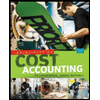
Concept explainers
(1)
Predetermined factory overhead rate
Normally,
To Calculate: The predetermined factory overhead rate for each alternative base for M Industries.
(1)
Answer to Problem 19.5CP
The predetermined overhead rate for alternative activity base is prepared as follows:
Direct labor cost:
Machine hours:
Working notes:
Total overhead for (2012 – 2016) is calculated as follows:
| Factory Overhead (Actual) | Amount ($) |
| 2012 | 790,000 |
| 2013 | 870,000 |
| 2014 | 935,000 |
| 2015 | 845,000 |
| 2016 | 760,000 |
| 4,200,000 |
Table (1)
Total direct labor cost, (2012 – 2016) is computed as below:
| Direct labor cost | Amount ($) |
| 2012 | 3,885,000 |
| 2013 | 4,410,000 |
| 2014 | 4,620,000 |
| 2015 | 4,200,000 |
| 2016 | 3,885,000 |
| 21,000,000 |
Table (2)
Total machine hours, (2012 – 2016) is computed as follows:
| Machine hours | Hours |
| 2012 | 93,000 |
| 2013 | 104,000 |
| 2014 | 111,000 |
| 2015 | 100,400 |
| 2016 | 91,600 |
| 500,000 |
Table (3)
Explanation of Solution
The total factory overhead is calculated by totaling all year’s actual overhead incurred in production. There are two activity bases. One is direct labor cost and another is machine hours. The total direct labor cost is determined by adding all year’s direct labor cost incurred. The total machine hours spent is determined by adding all year’s machine hours.
The predetermined overhead rate for direct labor cost is 20% of direct labor cost and predetermined overhead rate for machine hours is$8.40 per machine hour.
(2)
The over- or under applied overhead based on two predetermined overhead rates.
(2)
Answer to Problem 19.5CP
| Actual Overhead ($) | Applied Overhead ($) | (Over-) underapplied ($) | ||
| (a) | (b) | (c) = (a) – (b) | ||
| 2016 | Direct Labor cost | 790,000 | 777,000 (1) | 13,000 |
| Machine Hours | 790,000 | 781,200 (6) | 8,800 | |
| 2015 | Direct Labor cost | 870,000 | 882,000 (2) | (12,000) |
| Machine Hours | 870,000 | 873,600 (7) | (3,600) | |
| 2014 | Direct Labor cost | 935,000 | 924,000 (3) | 11,000 |
| Machine Hours | 935,000 | 932,400 (8) | 2,600 | |
| 2013 | Direct Labor cost | 845,000 | 840,000 (4) | 5,000 |
| Machine Hours | 845,000 | 843,360 (9) | 1,640 | |
| 2012 | Direct Labor cost | 760,000 | 777,000 (5) | (17,000) |
| Machine Hours | 760,000 | 769,440 (10) | (9,440) |
Table (4)
Working note:
The applied overhead for direct labor activity base is calculated as follows:
The applied overhead for machine hour’s activity base is calculated as follows:
Explanation of Solution
When actual overhead incurred is less than applied overhead, the overhead is said to be overapplied. Alternatively, when actual overhead incurred is greater than applied overhead, the overhead is said to be under applied.
(3)
To Discuss: In applying the best predetermined overhead rate as computed.
(3)
Explanation of Solution
The best predetermined overhead rate is machine hours. The total overhead applied is based on both machine hours and direct labor cost. The over- or underapplied overhead ranges from $9,440 (Overapplied) to $8,800 (Underapplied) when the rates are based on machine hours. The over- or underapplied overhead ranges from $17,000 (Overapplied) to $13,000 (Underapplied) when the rates are based on machine hours.
When comparing both, we could see less fluctuation in under or over applied overhead based on predetermined overhead rate based on machine hours in the year by year basis.
Want to see more full solutions like this?
Chapter 19 Solutions
2 Semester Cengage Now, Warren Accounting
- This Company uses standard costing. Variable overhead is applied at $8 per direct labor hour. Data for the month of September follows: Actual overhead variable costs Standard hours allowed for actual production Actual labor hours worked $ 78,000 10,000 9,800 How much is the controllable overhead spending variance? a. $2,000 favorable b. $400 favorable c. $400 unfavorable d. $2,000 unfavorablearrow_forwardNeed step by step answerarrow_forwardSolve this financial accounting problemarrow_forward
 Managerial AccountingAccountingISBN:9781337912020Author:Carl Warren, Ph.d. Cma William B. TaylerPublisher:South-Western College Pub
Managerial AccountingAccountingISBN:9781337912020Author:Carl Warren, Ph.d. Cma William B. TaylerPublisher:South-Western College Pub Principles of Cost AccountingAccountingISBN:9781305087408Author:Edward J. Vanderbeck, Maria R. MitchellPublisher:Cengage Learning
Principles of Cost AccountingAccountingISBN:9781305087408Author:Edward J. Vanderbeck, Maria R. MitchellPublisher:Cengage Learning Cornerstones of Cost Management (Cornerstones Ser...AccountingISBN:9781305970663Author:Don R. Hansen, Maryanne M. MowenPublisher:Cengage Learning
Cornerstones of Cost Management (Cornerstones Ser...AccountingISBN:9781305970663Author:Don R. Hansen, Maryanne M. MowenPublisher:Cengage Learning- Principles of Accounting Volume 2AccountingISBN:9781947172609Author:OpenStaxPublisher:OpenStax College
 Financial And Managerial AccountingAccountingISBN:9781337902663Author:WARREN, Carl S.Publisher:Cengage Learning,
Financial And Managerial AccountingAccountingISBN:9781337902663Author:WARREN, Carl S.Publisher:Cengage Learning, Survey of Accounting (Accounting I)AccountingISBN:9781305961883Author:Carl WarrenPublisher:Cengage Learning
Survey of Accounting (Accounting I)AccountingISBN:9781305961883Author:Carl WarrenPublisher:Cengage Learning





